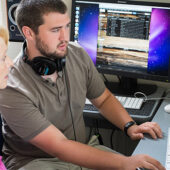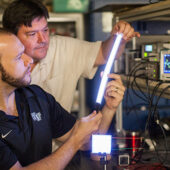A new way to train your ears
 Jamie Floyd has come up with a new way to teach music theory. The rising senior is using an Xbox Kinect and a visual programming language called Max to help people recognize different pitches of sound.
Jamie Floyd has come up with a new way to teach music theory. The rising senior is using an Xbox Kinect and a visual programming language called Max to help people recognize different pitches of sound.
 Jamie Floyd has come up with a new way to teach music theory. The rising senior is using an Xbox Kinect and a visual programming language called Max to help people recognize different pitches of sound.
Jamie Floyd has come up with a new way to teach music theory. The rising senior is using an Xbox Kinect and a visual programming language called Max to help people recognize different pitches of sound.
 A School of Business professor studies how organizations that don't support family life may end up causing more turnover among employees. The secret might just be to gaining the spouse's support.
A School of Business professor studies how organizations that don't support family life may end up causing more turnover among employees. The secret might just be to gaining the spouse's support. Categories: Mentorship, Research & Discovery, University Announcements
 U.S. News and World Report’s 2013 Best Colleges guide ranked Wake Forest 13th among national universities with the best undergraduate teaching. But, the nearly magical interaction between professors and bright students is not limited to classroom, studio, stage or laboratory. Many faculty become mentors for students as they explore academic and extracurricular interests.
U.S. News and World Report’s 2013 Best Colleges guide ranked Wake Forest 13th among national universities with the best undergraduate teaching. But, the nearly magical interaction between professors and bright students is not limited to classroom, studio, stage or laboratory. Many faculty become mentors for students as they explore academic and extracurricular interests.Categories: Campus Life, Experiential Learning, Mentorship, Research & Discovery
 Casa Artom, Wake Forest’s residential study center on Venice’s Grand Canal, became a gathering place for artists, curators, collectors and art critics during the opening of La Biennale di Venezia this summer.
Casa Artom, Wake Forest’s residential study center on Venice’s Grand Canal, became a gathering place for artists, curators, collectors and art critics during the opening of La Biennale di Venezia this summer.Categories: Alumni, Arts & Culture, Experiential Learning, Global Wake Forest, Research & Discovery
 Wake Forest is pushing the envelope on cutting-edge research. From a new kind of light bulb to mapping the landscape of leaders’ brains, technologies developed by Wake Forest researchers during the 2012-2013 academic year are redefining how we think about everything from ecology to economics.
Wake Forest is pushing the envelope on cutting-edge research. From a new kind of light bulb to mapping the landscape of leaders’ brains, technologies developed by Wake Forest researchers during the 2012-2013 academic year are redefining how we think about everything from ecology to economics.
Categories: Research & Discovery, University Announcements
 Can you become more honest, courageous or kind by reading a book? Christian Miller, director of The Character Project, recommends six new books and three essays that reveal surprising truths about character and how to improve it.
Can you become more honest, courageous or kind by reading a book? Christian Miller, director of The Character Project, recommends six new books and three essays that reveal surprising truths about character and how to improve it.Categories: Research & Discovery
 Arts and humanities are naturally woven into academics at Wake Forest. From a concert to promote environmental conservation and a student art buying trip to a Musicircus and an interdisciplinary symposium on biotechnology, students enjoyed opportunities to learn through a variety of lenses during the 2012-2013 academic year.
Arts and humanities are naturally woven into academics at Wake Forest. From a concert to promote environmental conservation and a student art buying trip to a Musicircus and an interdisciplinary symposium on biotechnology, students enjoyed opportunities to learn through a variety of lenses during the 2012-2013 academic year.
Categories: Arts & Culture, Campus Life, Research & Discovery, University Announcements
 High-intensity strength training may help older individuals manage knee pain due to debilitating knee osteoarthritis. A new study at Wake Forest is developing a surgery-free and effective option to treat knee pain and loss of mobility associated with knee osteoarthritis.
High-intensity strength training may help older individuals manage knee pain due to debilitating knee osteoarthritis. A new study at Wake Forest is developing a surgery-free and effective option to treat knee pain and loss of mobility associated with knee osteoarthritis.
Categories: Research & Discovery, University Announcements
 Developed by WFU researchers, BioBook turns lengthy, complex topics into small, manageable chunks of knowledge that can be changed as educators see fit. Within three years, BioBook (about $30) is expected to replace paper textbooks ($200+) for students taking general biology at Wake Forest and Forsyth Technical Community College.
Developed by WFU researchers, BioBook turns lengthy, complex topics into small, manageable chunks of knowledge that can be changed as educators see fit. Within three years, BioBook (about $30) is expected to replace paper textbooks ($200+) for students taking general biology at Wake Forest and Forsyth Technical Community College.Categories: Community Impact, Research & Discovery, University Announcements
 Wake Forest's Sean Hannah and a team of researchers have found measuring activity in the prefrontal cortex of the brain can help assess that person’s potential for leadership -- which could have a big impact on how future leaders are tested and trained.
Wake Forest's Sean Hannah and a team of researchers have found measuring activity in the prefrontal cortex of the brain can help assess that person’s potential for leadership -- which could have a big impact on how future leaders are tested and trained.Categories: Mentorship, Research & Discovery, University Announcements